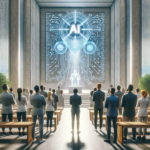Welcome to the latest edition of FindBiometrics AI update. Here’s the latest big news on the shifting landscape of AI and identity technology:

America’s actor and writer unions are demanding contracts that explicit offer protections against displacement by artificial intelligence. The Screen Actors Guild-American Federation of Television and Radio Artists (or SAG-AFTRA) has joined the striking workers of the Writer’s Guild of America out of concerns about deepfake technology being used to generate performances of living artists without their consent. “If we don’t stand tall right now, we are all going to be in trouble,” said SAF-AFTRA president Fran Drescher. “We are all going to be in jeopardy of being replaced by machines.”
Shutterstock, the prominent stock image provider, has entered a six-year partnership with OpenAI, the company behind the ChatGPT chatbot and the DALL-E image generator. Expanding on a narrower deal that was previously established between the companies, the new agreement will give OpenAI expanded access to Shutterstock’s libraries of photos, videos, and music, as well as associated metadata, for the purpose of training AI algorithms. In return, Shutterstock will receive early access to OpenAI’s innovations, and will help the company to build its own text-to-image generator.
The Cyberspace Administration of China has published new regulations, set to take effect in mid-August, concerning generative AI technologies. Companies will have to obtain a license before releasing such a product, and those developing generative AI for public use will need to submit to a security assessment. The move comes after the CAC published a white list of approved suppliers of deepfake technology last month — a list that included tech giants like Alibaba, Baidu, and Tencent.
Foxconn, a key components supplier to Apple, has pulled out of a joint project to establish semiconductor and display manufacturing facilities to the Indian state of Gujarat. It was to be a joint effort with the Indian conglomerate Vedanta. Foxconn hasn’t given a reason for abandoning the project, but there have been signs of distress, including deadlocked negotiations to bring in STMicroelectronics as a partner. Foxconn is still working on other factories in the country, but the $19.5 billion joint venture in Gujarat would have been its biggest.
New York-based vAIsual Inc. has launched a training dataset for machine learning that comprises thousands of images of people of Asian ethnicity. In a statement, the company explained that its “Asian People in Context” dataset, built in collaboration with the Vietnamese stock photo company Dragonimages, “will play a crucial role in training AI models to recognize, classify, and analyze Asian scenes and characters.” The company also explained that its dataset is only available to non-European clients, “due to non-GDPR compliant model releases.”
Carnegie Mellon University (CMU) and Fujitsu researchers have pioneered a method of converting a 2D image into a three-dimensional one. The Dynamic Light Field Network (DyLiN) uses artificial intelligence technology to model deformation fields, which describe how each point on an object changes when it transforms. According to the researchers, their method matched the visual fidelity of other state-of-the-art methods while being 25 to 71 times faster in terms of computation times. An enhanced method, dubbed “CoDyLiN”, allows the addition of controllable attribute inputs. Both DyLiN and CoDyLiN offer applications such as modelling 3D human faces based on 2D images.
OpenAI and Microsoft are facing a lawsuit under Illinois’s Biometric Information Privacy Act (BIPA), for allegedly collecting the face biometrics of individuals depicted in photos on the internet without the individuals’ knowledge or consent. OpenAI’s scraping of text data for the training of its GPT large language model has been well documented. Whether the company also used biometric data to train its image generator, DALL-E, is a much murkier question. The answer may not matter: In a separate BIPA case concerning a face-scanning dashboard camera used in the trucking industry, a recent ruling suggested that what matters is the collection of biometric data itself, and not necessarily the purpose for which it was collected.
The chatbot’s take: Bing seems to be worried about how the actors’ strike will affect the economy.

–
July 14, 2023 – by Alex Perala








Follow Us